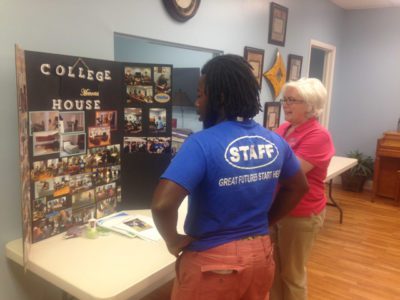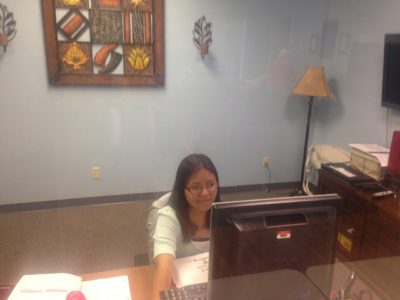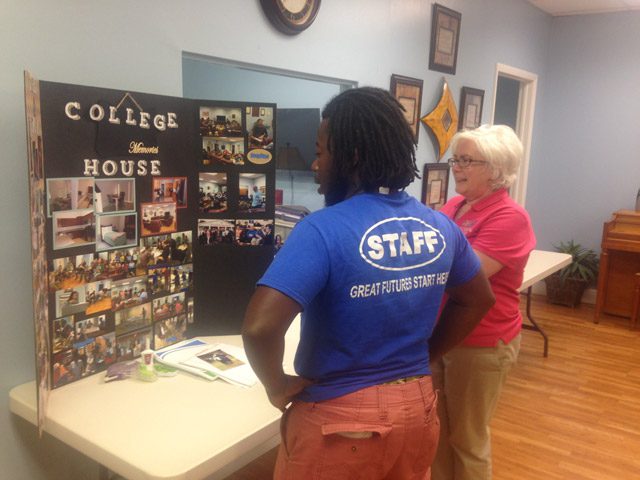As U.S. college debt crisis tops $1 trillion, The Salvation Army devises new ways to help keep students afloat.

The junior stays quiet while his classmates talk about their mounting student debt.
Jerry Bazilme, 21, studies physical education at the University of South Florida. Like many students, he also works part-time and wrestles with how he will pay tuition, rent and all the other costs that go along with college.
Student loan debt has skyrocketed over the last decade, reaching a record-high $1.2 trillion in 2015, according the Consumer Financial Protection Bureau.
“[Classmates] always talk about the loans they take out and the cost of schooling and the price they pay for rent and cable and internet,” Bazilme said. “When they do talk about finance, I just keep quiet.”
Because even though Bazilme must juggle different financial responsibilities, programs through The Salvation Army have helped make paying for school more manageable. Bazilme is one of 16 students living in subsidized housing as part of a Salvation Army program in Tampa, Fla.
For $200 a month, Bazilme and other students live in condos on the northwest part of town, within driving distance to about half a dozen local schools. Their rent covers all utilities—including cable and internet—and provides access to other benefits, such as a student center outfitted with a game room, library and computer room.

The program—available to any full-time student associated with The Salvation Army for at least a year—is the first of its kind in the nation, said student resident manager Captain Teresa Della Monica.
“We saw there was a need for affordable housing for so many of our own college students,” Della Monica said. “This program allows them to worry less about how they will pay for housing. About half of our students are not going to go into debt.”
The program oversees seven condos, each with room for seven students, ages 18-24. Della Monica lives in an eighth condo and is available at all times to assist the students in matters of faith and life. Even the little things, such as learning how to cook and keep a clean living space, are lessons each student must learn.
“They’re just coming out of their parent’s homes, so they’re a little sheltered, but they’re curious about life,” said Della Monica, who has been with the program since it started six years ago. “They’re stretching and growing, but they’re doing it in a controlled manner.”
Each student in the program is expected to attend an area corps and volunteer at least one hour per week. Some of those volunteer initiatives also provide scholarships for the students involved, adding another layer of financial assistance.
“It’s a huge weight off my shoulders, especially for financial reasons,” Bazilme said, recalling an incident when work shorted him on hours a couple months ago. When his $230 paycheck came, he breathed a sigh of relief. If he was living in his old apartment, he’d have to have a conversation with his landlord about how he couldn’t make rent that month. But through The Salvation Army program, he’s able to pay that month’s rent and put some gas in his car. The less he stresses about finances the more he can focus on his studies, his classes and his job.
Salvation Army programs across the country are doing what they can to help, offering scholarships, grants for children of officers and summer employment opportunities.
And for those students looking for an affordable college degree, The Salvation Army’s Booth University College in Winnipeg, Canada, has put a premium on keeping costs low.

Tuition and fees for one year cost Canadian and American students about $8,000 (Canadian dollars). There are no application fees or otherwise hidden dues. The school also offers merit and program scholarships, along with a Salvationist Tuition Incentive. The result often is a manageable, affordable college degree, said Major John Murray, vice president of advancement.
“The value of the education vis a vis the programs we offer, access to professors and small classrooms, is tough to match,” Murray said. “We would consider ourselves a sort of niche market type of school.”
Apart from his role with the school, Murray, a father of four college age sons, knows the reality of rising higher education costs.
“I’m not sure that people at age 18, 19, 20, just from a life perspective point of view, understand and appreciate the rising cost of school,” Murray said. “Not just the shear responsibility of that, but also how long it will take to pay off.”
Ultimately, providing access to quality education is key to helping individuals unlock their full potential.
“Certainly education is a huge priority for us as an organization,” Murray said. “It is a way for people to get out of poverty and better their lives.”












